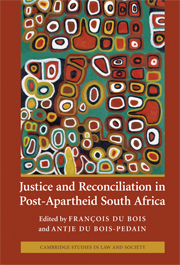Book contents
- Frontmatter
- Contents
- List of tables and figures
- List of contributors
- Acknowledgements
- List of abbreviations
- Introduction
- 1 Reconciliation as surrender: configurations of responsibility and memory
- 2 Radical forgiveness: transforming traumatic memory beyond Hannah Arendt
- 3 Communicating criminal and political responsibility in the TRC process
- 4 The contribution of criminal justice
- 5 Reparation and the forms of justice
- 6 Land restitution and reconciliation in South Africa
- 7 For justice and reconciliation to come: the TRC archive, big business and the demand for material reparations
- 8 Transition, forgiveness and citizenship: the TRC and the social construction of forgiveness
- 9 The evolving legitimacy of the South African Constitutional Court
- 10 Drawing the line: justice and the art of reconciliation
- 11 Post-conflict justice and the reconciliatory paradigm: the South African experience
- Index
- References
3 - Communicating criminal and political responsibility in the TRC process
Published online by Cambridge University Press: 01 July 2009
- Frontmatter
- Contents
- List of tables and figures
- List of contributors
- Acknowledgements
- List of abbreviations
- Introduction
- 1 Reconciliation as surrender: configurations of responsibility and memory
- 2 Radical forgiveness: transforming traumatic memory beyond Hannah Arendt
- 3 Communicating criminal and political responsibility in the TRC process
- 4 The contribution of criminal justice
- 5 Reparation and the forms of justice
- 6 Land restitution and reconciliation in South Africa
- 7 For justice and reconciliation to come: the TRC archive, big business and the demand for material reparations
- 8 Transition, forgiveness and citizenship: the TRC and the social construction of forgiveness
- 9 The evolving legitimacy of the South African Constitutional Court
- 10 Drawing the line: justice and the art of reconciliation
- 11 Post-conflict justice and the reconciliatory paradigm: the South African experience
- Index
- References
Summary
INTRODUCTION
‘I'm not guilty – De Klerk’ is the striking headline of a front page article published in the wake of the only trial thus far of a former National Party minister for apartheid-era crimes. The former minister is Adriaan Vlok; his portfolio was ‘law and order’ in the final phase of apartheid's unravelling, when the security police increasingly resorted to clandestine attacks on prominent anti-apartheid figures to stem the ever-rising tide of resistance against the government. Vlok was charged in August 2007 for his role in the attempted poisoning in 1989 of the Reverend Frank Chikane, then secretary general of the South African Council of Churches. The case ended with a plea bargain under which Vlok received a suspended sentence of ten years' imprisonment. Vlok later insisted that there was little evidence to link him to the crime: he pleaded guilty, he claimed, because he did not want to leave his former operatives out in the cold. F.W. de Klerk, who took over from P.W. Botha as state president in 1989, still maintains that he was never personally aware of any policy that authorised the extra-legal killing of political activists. The arresting headline neatly sums up a litany of denials of any personal responsibility, for apartheid and the means by which it was secured, that De Klerk has been issuing since 1994 – along with claims that outrageous acts of the sort Vlok was charged with, were committed by a few ‘bad apples’ among the security forces.
- Type
- Chapter
- Information
- Publisher: Cambridge University PressPrint publication year: 2009



